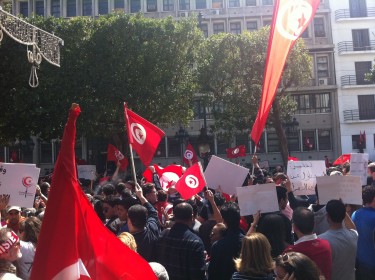This post is part of our special coverage Tunisia Revolution 2011.
On October 23, 2011, Tunisians elected an assembly to draft its new constitution, following the toppling of the Ben Ali regime. Now, five months later, the assembly has just started studying the draft proposals. Yet, disagreements about the first article of the constitution is slowing down the work of the assembly and Islam and the Arab identity are at the heart of debates nationwide.
Blogger Mohamed Ali Charmi took the initiative to propose the first three articles on his blog, bidules8. In his post [ar], El Cherni suggests that Tunisia should remain a civil state whose religion is Islam and whose official language is Arabic. He also stresses that Tunisia be open to other neighboring civilizations and cultures, naming the North-African, African, Arab, Mediterranean and European cultures.
In the same first article, Charmi reminds us of the design of the Tunisian flag. Perhaps, this initiative is a reaction to the discretion of Tunisian flag when a Salafi student lowered the Tunisian flag and raised the Salafist flag instead.

Tunisia Celebrates Independence Day – March 20
Charmi suggests that the second article of the constitution should protect the freedoms and dignity of all Tunisian citizens. He writes [ar]:
سلامته الجسدية وعدم تسليط أي شكل من أشكال التعذيب الجسدي أو النفسي
حرية المعتقد و التعبير و الصحافة و النشر و التنقل و التظاهر والعمل النقابي و التجمع في احزاب ومنظمات وجمعيات وتعاضديات وجماعات ونقابات.
دون تميز على أساس دين أو لون أو جنس أو جهة وفي إطار سلمي و ما دامت لا تدعو للكراهية والعنف والإقتتال و تحترم مبادئ الحرية و المساواة.
– Physical safety and ban of all sorts of physical or psychological torture.
– Freedom of belief, expression, press, publication, movement, manifestation, trade union activity, assembling in political parties, association, collectives and syndicates with no distinction based on religion, color, gender and region as long as its peaceful and do not call for hatred, violence, conflicts and ban the grounds of freedom and equality.
The third article emphasizes that Tunisia keeps the democratic republican regime that brings about pluralism and peaceful rotation of power. It approves the separation of powers and criminalizes any attempts to turn back on these foundations.
The apparent schism between the ends of political spectrum in Tunisia has reflected a gap within the Tunisian society that is drifting apart in two segments in the absence of any serious action to help the country progress towards an understanding. Therefore, once again, the community of Internet users in Tunisia is taking a stand to influence politicians to choose the best alternatives for Tunisians.
This post is part of our special coverage Tunisia Revolution 2011.







3 comments